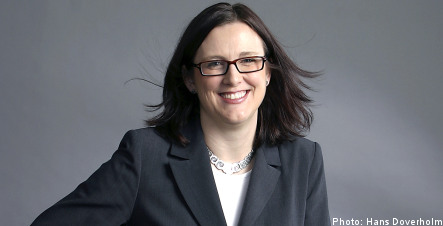Separated from mainland Europe by a body of water and far from the EU’s bustling Brussels headquarters, Sweden’s geographical distance from the heart of the action has long been complemented by a similar psychological divide. Yet, from July 1st, Sweden takes over the rotating EU presidency and plans are underway to lead the country to the core of Europe.
This marks a decisive shift in Sweden’s traditional policy towards the EU, from a country sceptical towards Europe to one seeking a more central role and openly embracing it. The move is not limited to the confines of Parliament; Cecilia Malmström, Minister of EU Affairs, sees public support for the EU among the Swedish people and hopes that the presidency will bolster it.
“We see the presidency as a unique opportunity to increase interest in the EU in Sweden and show how EU issues affect people’s day-to-day lives”, Malmström tells The Local. In order to achieve this aim, a special secretariat employing 20 people has been established to coordinate communication in the run up to and during the presidency itself.
Preparing for the EU presidency is a huge undertaking. Preparations began in earnest in autumn 2006 when the current government took office, and Malmström reveals that “most people at the government offices are involved in one way or another in the presidency [preparations]”.
Over 3,000 meetings are scheduled for the six-month presidency, the vast majority of which are being held in Brussels or Luxembourg but some 100 meetings will also take place in Sweden. A secretariat of 55 personnel alone is charged with overseeing the practical implementations of the meetings on national soil. They have an exhaustive list of logistical preparations that ranges from the critical issue of security arrangement to organising interpretation and translation services for the visiting dignitaries of the 27 member states to the finer details of the meals that will be served.
“We are very well prepared”, says Anders Tagesson of Sweden’s security police, Säpo, on the subject of security provisions for the meetings in Sweden.
“We are working together with the national criminal police, the government and the local police to ensure that the meetings are conducted safely, both for the officials and the public alike”.
On July 1st, the preparations will make way for the real work of presiding over the EU. Sweden has a clear set of priorities and at the top of the list are climate change, economic growth and immigration.
“A lot of Swedes feel strongly about the climate issue and Sweden is in many aspects a role model for other countries. Not least, we’ve shown that by applying forward-looking climate policies we can have both economic growth and reduced emissions. During our presidency, our goal is for the EU to successfully bring about a global agreement when the United Nations holds its climate conference in Copenhagen in December 2009”, explains Malmström.
Sweden will act “forcefully” towards helping Europe recover from the economic crisis and to “restore confidence in the financial system”. Malmström asserts, “the EU as a whole must hasten economic recovery, create jobs and promote welfare in member states”.
The agendas are ambitious, but even before the start of the presidency, it is clear that Sweden will likely face challenges in achieving its priorities. Sweden’s presidency will have to cope with severe operational challenges because it coincides with the installment of a new EU Parliament and Commission, and both institutions will require time to normalise their operations, “making things more difficult than they usually are”.
Then there are concerns about the achievements of the present Czech EU presidency and its effects on Sweden’s presidency. Sweden is a member of a trio presidency with France and the Czech Republic, together the trio have agreed on an 18-month programme of shared objectives with France leading the way in July 2008, followed by the Czech Republic and concluding with Sweden.
The problem is that the incumbent Czech president, Mr. Vaclav Klaus, is a staunch eurosceptic and holds contrary views about climate change, which are completely at odds with the trio presidency. Although Klaus holds a non-executive office and has little influence over the proceedings of the Czech EU presidency, the fact that his country is presiding over the EU afford him more media coverage than warranted and brings public attention to his personal viewpoint, potentially undermining the collective stance of the trio presidency.
Malmström does not see reasons for concern. “With the recent fall of the Czech government the domestic situation for the Czechs is far from stable. But I am confident that the Czech Republic will continue conducting the Council Presidency as effectively as it has done until now,” says Malmström.
“When Sweden takes over on the 1st of July, we will continue working together with the Czech Republic on important issues such as the climate issue, the financial crisis, employment and the international relations of the EU”.
Malmström’s positivism is clear and she is confident that the Swedish presidency will be a success. “We will do our very best to conduct an effective, open and result-oriented presidency in the interests of the whole of Europe”, she says.
Hardly the words of a shy wallflower; this is fighting talk from a country with unmistakable ambitions. The Swedish EU presidency may very well witness a new, more active Sweden on the EU stage.



 Please whitelist us to continue reading.
Please whitelist us to continue reading.
Member comments